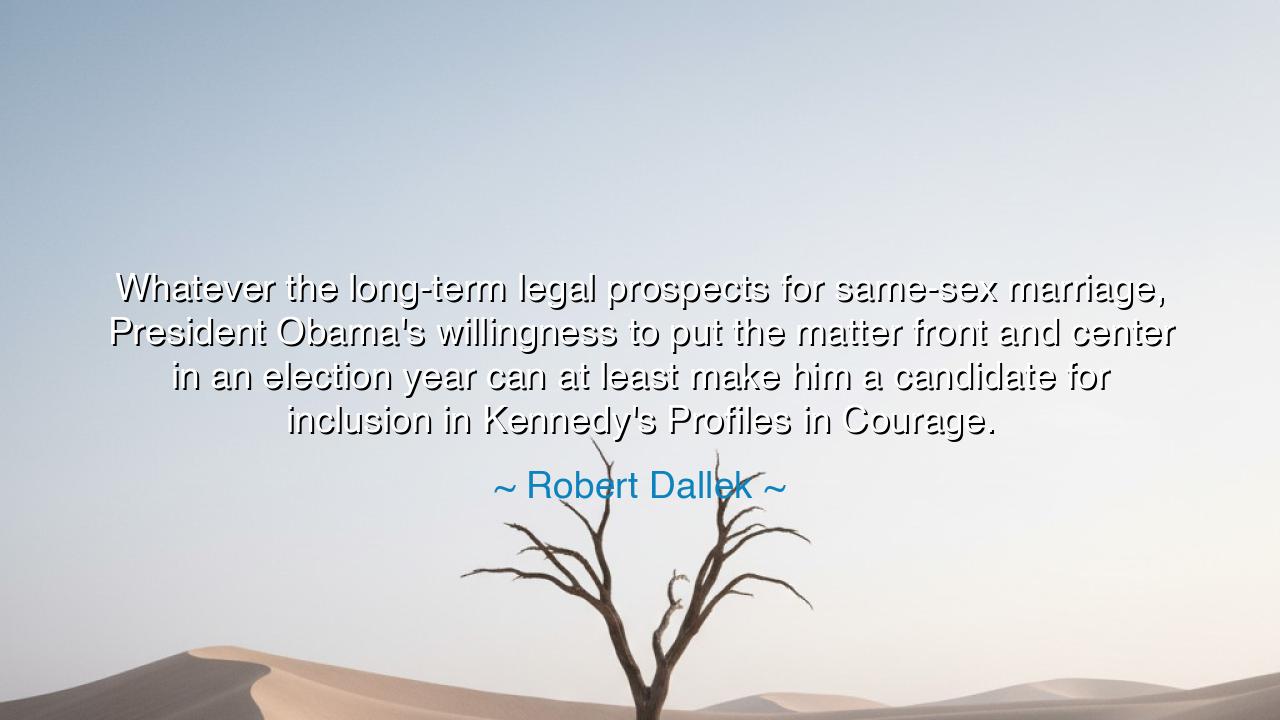
Whatever the long-term legal prospects for same-sex marriage
Whatever the long-term legal prospects for same-sex marriage, President Obama's willingness to put the matter front and center in an election year can at least make him a candidate for inclusion in Kennedy's Profiles in Courage.






“Whatever the long-term legal prospects for same-sex marriage, President Obama’s willingness to put the matter front and center in an election year can at least make him a candidate for inclusion in Kennedy’s Profiles in Courage.” — Thus spoke Robert Dallek, historian of power and conscience, reflecting on a moment when a leader chose truth over convenience. For in those few words lies the eternal tension between political prudence and moral courage — the struggle between the safe path of silence and the dangerous road of conviction. The words summon us to remember that true leadership is not measured by popularity, but by the willingness to stand for what is right when the world would rather one stand aside.
In the year 2012, the winds of division blew fiercely across the American land. The question of same-sex marriage was not yet settled law, and to speak in its favor was to invite both scorn and political peril. Yet President Barack Obama, in the midst of his bid for re-election, stepped into the light and declared his belief that love between two people — regardless of gender — deserved the sanctity and recognition of marriage. It was a simple statement, but it carried the weight of centuries. To millions it was liberation; to others, defiance. But above all, it was courage — the courage to speak the truth of equality, even when the cost was uncertain.
When Dallek invoked Kennedy’s Profiles in Courage, he did not speak lightly. For in that noble book, President John F. Kennedy had enshrined the stories of senators who, in moments of moral crisis, placed conscience above comfort. They risked their reputations, their offices, and sometimes their lives for the sake of principle. Obama’s act, Dallek suggests, belongs to that same tradition — a continuation of the ancient line of leaders who dared to see beyond the present moment, who understood that justice delayed by fear is justice denied.
The ancients too knew this form of bravery. Pericles, in the glory of Athens, declared that a city’s greatness lay not in its walls or wealth, but in the courage of its citizens to speak truth even when unpopular. Such courage does not roar with anger; it speaks calmly, yet it changes the world. Obama’s declaration did not wield the power of law that day — it wielded the power of example. It shifted hearts before it changed statutes, and by doing so, it began to reshape the moral landscape of a nation.
Consider the tale of Galileo, who, centuries earlier, stood before the tribunal of power and declared that the Earth moved around the sun. The truth endangered him; silence could have saved him. Yet he spoke, and though condemned, his courage illuminated the path for generations of thinkers to come. In like manner, when Obama spoke for love and equality, he risked misunderstanding and rejection, yet his words lit a torch that others would carry to the courtrooms and legislatures that followed. Such is the nature of moral progress — it begins not in victory, but in valor.
Courage, as Dallek reminds us, is rarely convenient. It is the art of acting rightly in the face of fear. The wise understand that politics, like all human endeavors, often tempts one to compromise principle for gain. But the true statesman, like the true hero, measures worth not by applause, but by integrity. To be named among the “Profiles in Courage” is to belong to the fellowship of those who, across time, have chosen justice over safety, truth over comfort, and conscience over convenience.
The lesson of Dallek’s reflection is clear: each generation is tested, not by the battles it wins, but by the truths it dares to tell. You need not be a president to act with courage. Speak when silence would betray what is right. Defend those whom others overlook. In the small decisions of daily life — in the home, the workplace, the street — courage still calls, softly but insistently. For every voice raised in truth becomes part of the chorus that bends history toward justice.
So remember this, my child: the world changes not through the thunder of armies, but through the quiet bravery of those who speak with conviction. Courage is the bridge between what is and what ought to be. When you are faced with fear, remember those who walked before you — the philosophers, the prophets, the reformers, and yes, even presidents — who dared to place principle above power. For it is through such acts of light, carried in trembling hands, that humanity learns once more to find its way through the dark.






AAdministratorAdministrator
Welcome, honored guests. Please leave a comment, we will respond soon